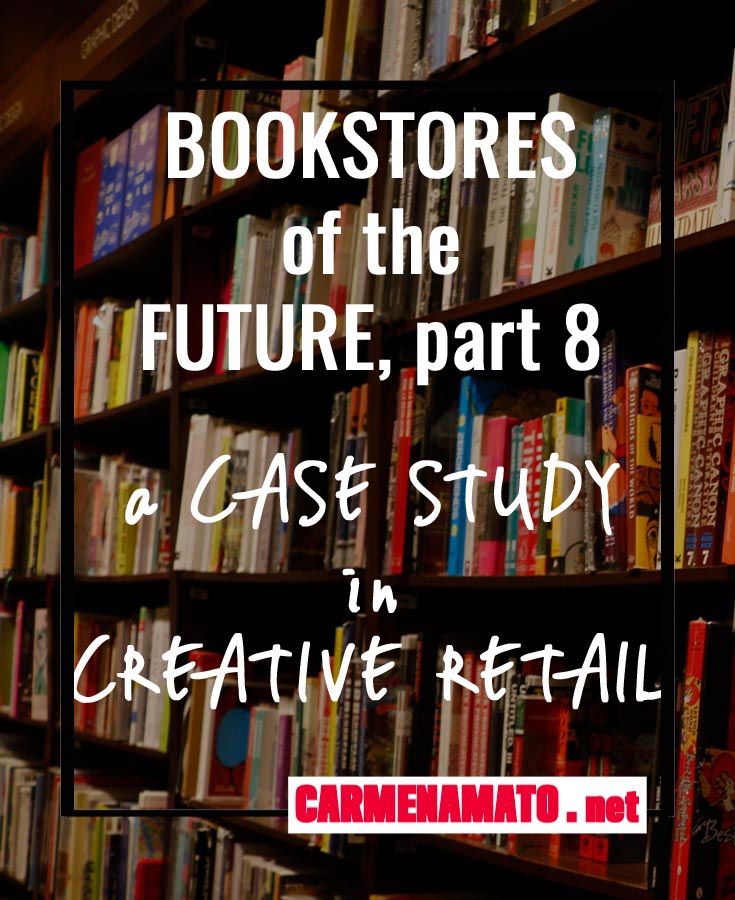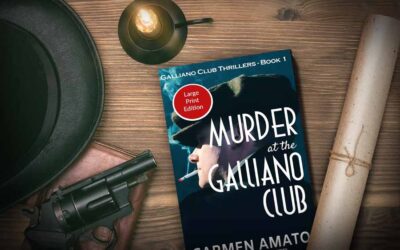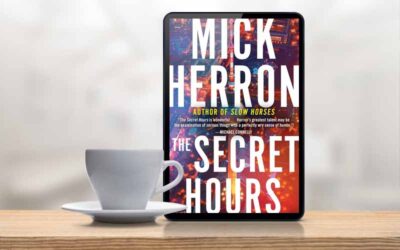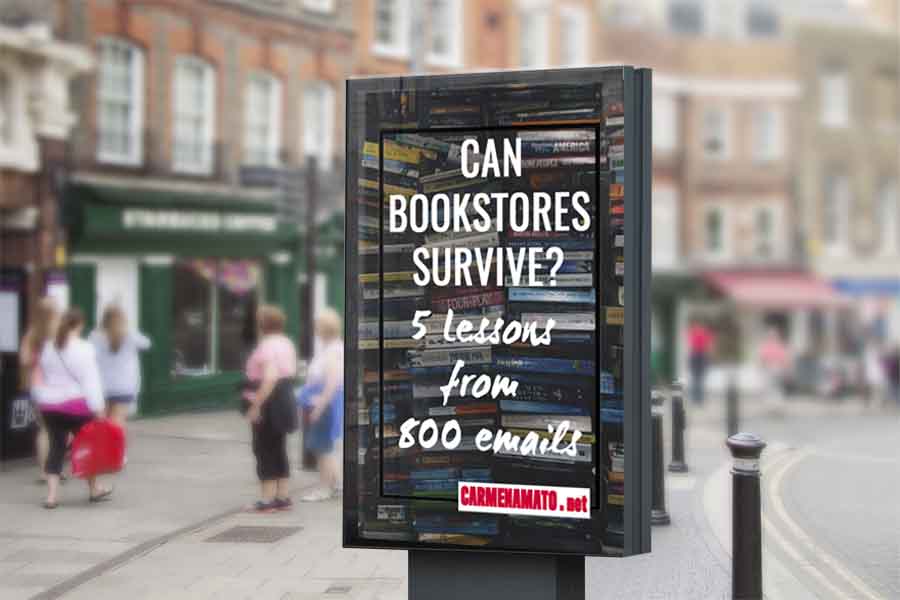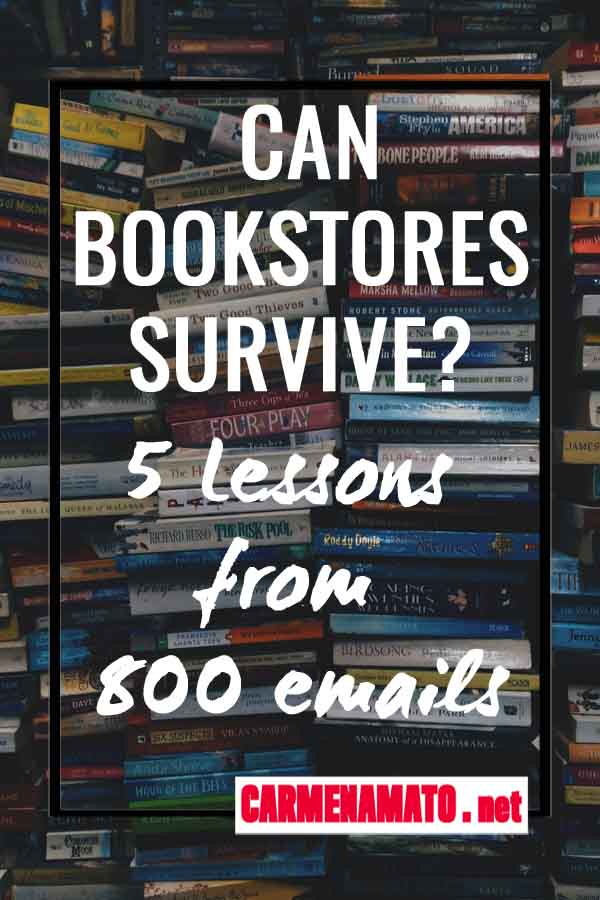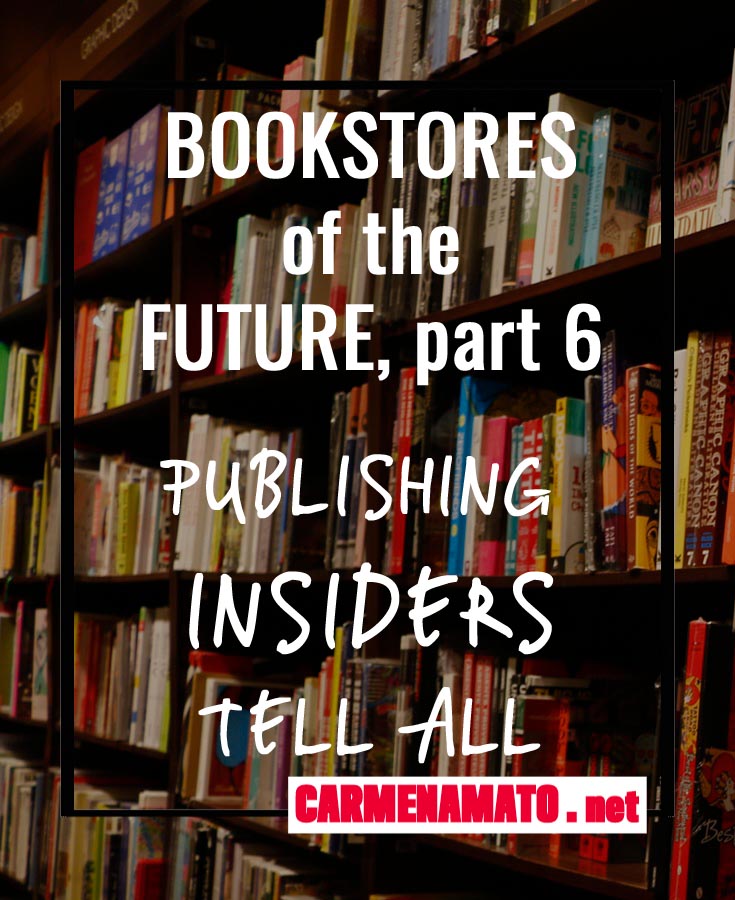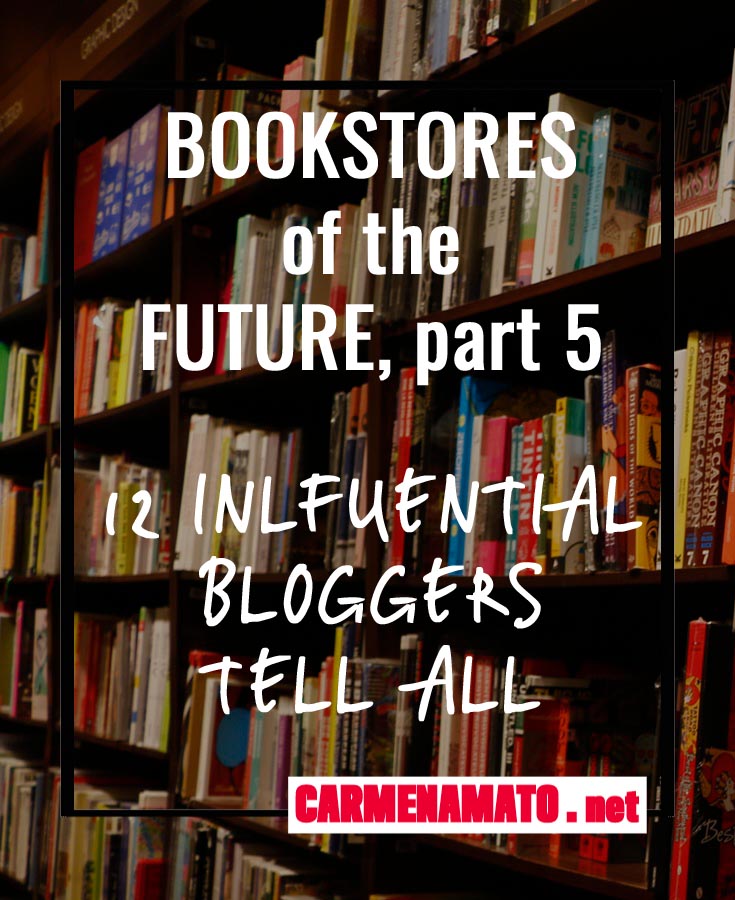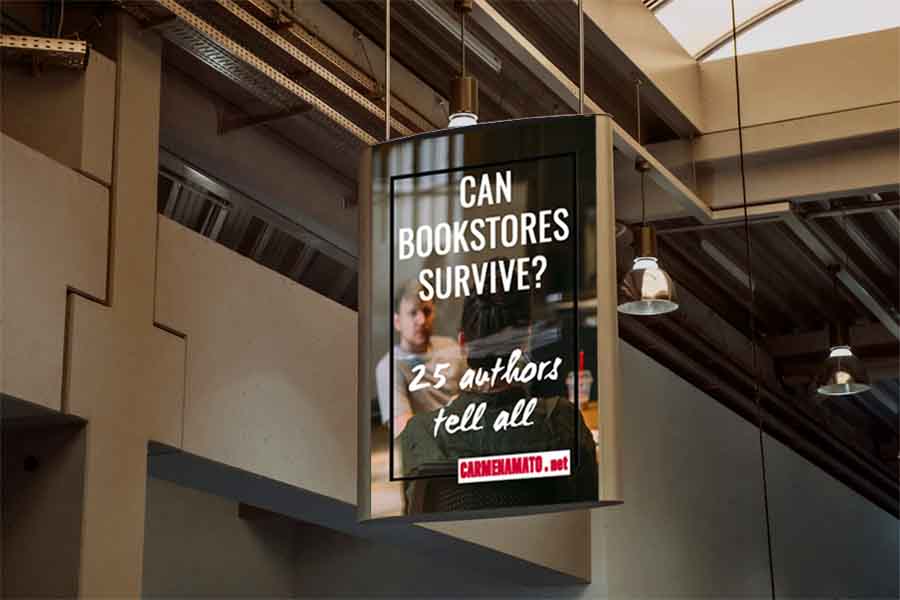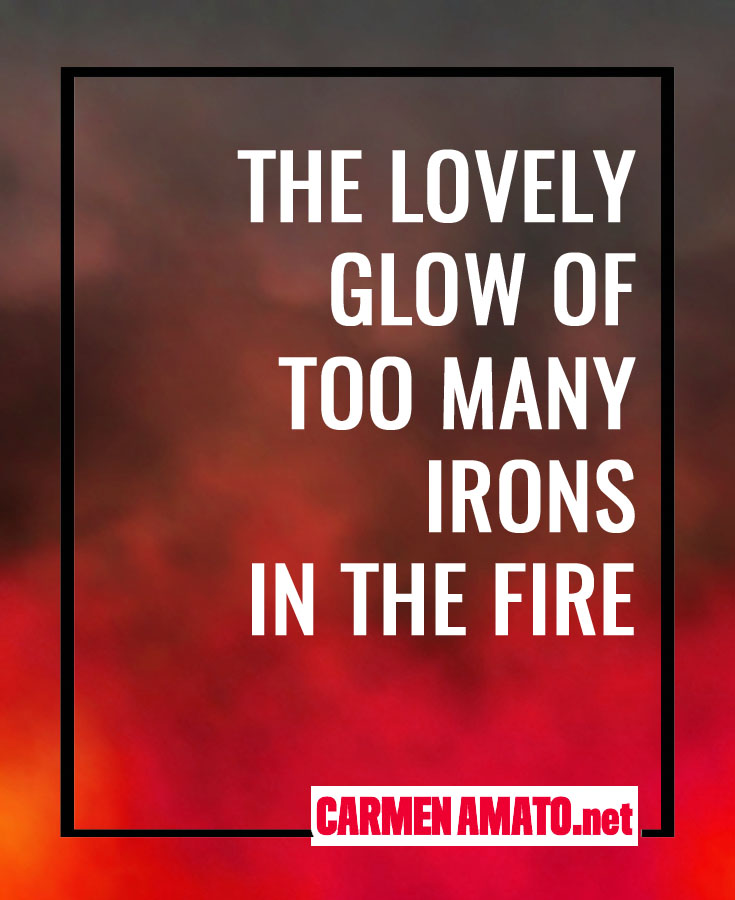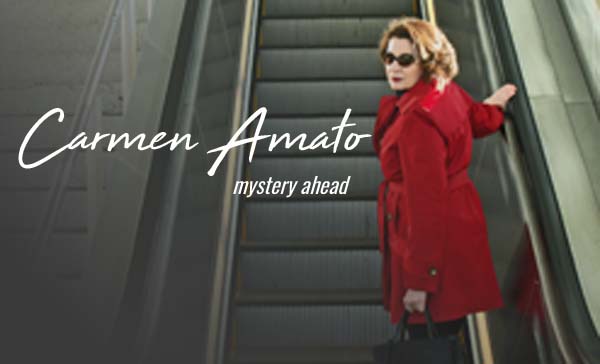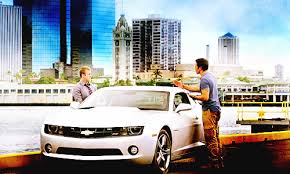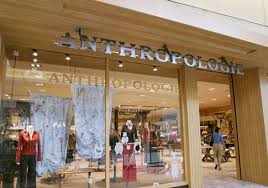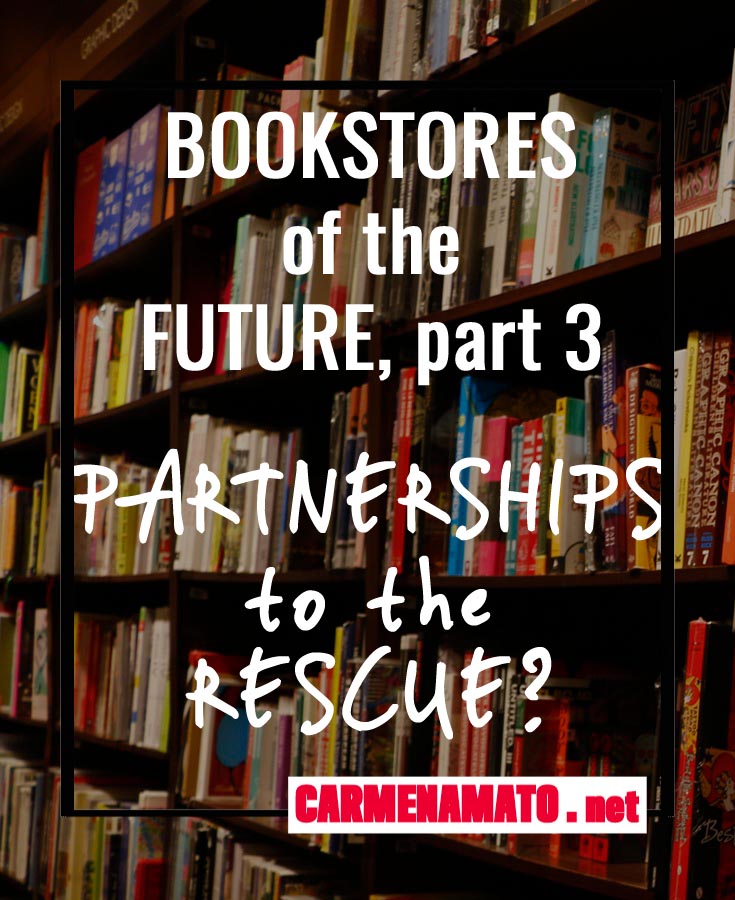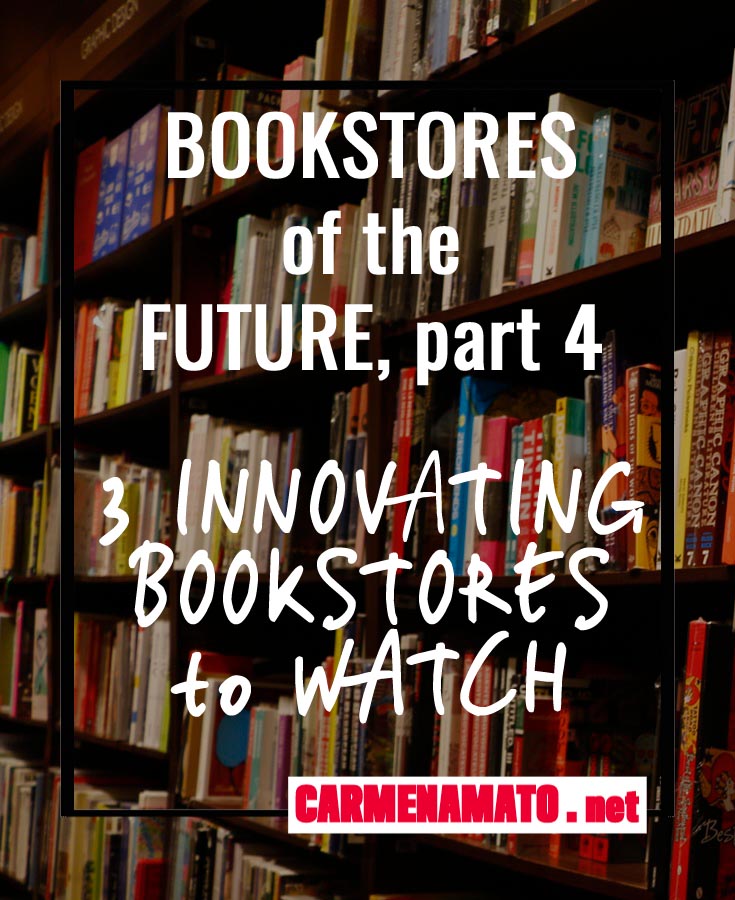Can bookstores survive in the era of ebooks and ecommerce?
Dramatic changes in the publishing industry have impacted the way authors, even influential authors, get their books to readers. Traditional book publishing and retail models have been battered by the rise of online retailers. The ebook revolution has given us more books to choose from, so much so that books are easily lost in the virtual churn.
Many brick-and-mortar bookstores, including the US-based Borders chain, have closed in recent years, unable to compete or adjust. Will we see more closings in the years to come, or will bookstores innovate in order to stay relevant and solvent?
I reached out to fellow authors and was amazed at the variety of responses. Read on for some surprising views on the future of the bookstore. (Note: comments arranged in alphabetical order by author last name, so yes, I got to go first.)
Carmen Amato, author of THE HIDDEN LIGHT OF MEXICO CITY and the EMILIA CRUZ mystery series
http://carmenamato.net
The ebook format, driven by Amazon’s Kindle platform and subscription services like Oyster, will become the industry standard for books that are mostly text. As a result, bookstores will no longer derive a significant percentage of revenue from fiction. Bookstores that survive will increasingly focus on non-fiction books that don’t lend themselves to ebook formats, such as manga/comics, design (art, photography, shelter) books, cookbooks, science and technology volumes, etc, as well as vintage books for collectors.
Bookstores will also have to rethink their spaces because they simply won’t be able to afford the square footage. Successful ones will partner imaginatively with other retailers, such as art galleries, clothing boutiques, kitchen stores, and even gaming stores to sell wares in shared spaces arranged to provide an optimal sensory experience that is unavailable online. The key will be to curate the books on offer to match the partners’ products and target the same customer. Other partnerships could be with hotels or museums. Bookstores will use their spaces to host events and be part of a local community.
To make this happen, however, traditional book distribution has to change and become more flexible. Store owners have a universe of books to choose from, but as long as they are tied to an inflexible distribution system, they’ll be unable to offer books which could help keep them afloat. Article author.
G.G. Atcheson, author of THE LEGACY: FATE
Bookstores will become small kiosks like the ones that sell print pictures on demand. Users will go to those places to order a print of their favorite book(s) in the format and size of their choice. They will also bring people together to talk about those books over a hot cup of coffee. Via website comment form, 5 November 2013.
Susan M. Boyer, author of the Liz Talbot Mystery Series including LOWCOUNTRY BOIL and LOWCOUNTRY BOMBSHELL
http://www.susanmboyerbooks.com
Independent bookstores [will] leverage strong customer relationships and serve as social hubs for book lovers, offering meeting space for book clubs, luncheons with author speakers, and other opportunities for readers to connect and spend time with friends who share an interest in books. I also believe the staff of these stores will continue to provide personal service, an area in which they’ve traditionally excelled. Online sales of autographed books are another avenue some stores are already pursuing. Via website comment form, 11 November 2013.
Dale Brown, author of 21 action-adventure “techno-thriller” novels including FLIGHT OF THE OLD DOG, SILVER TOWER, DAY OF THE CHEETAH, HAMMERHEADS, and the DREAMLAND series.
http://www.dalebrown.info/index02.htm
I haven’t been in a bookstore to buy a book since I discovered Amazon Books in 1996.
I don’t think book sales will be much affected by whatever happens to brick-and-mortar bookstores because it’s so easy and convenient to get a book these days, and with the Internet you don’t need to browse through a bookstore’s shelves to find a new release from a favorite author–Facebook, Twitter, a Web site, or the blogosphere will inform you.
My Mom and my in-laws would certainly have disagreed with me and continued going to bookstores or Wal-Mart every couple weeks to see what’s new…until they got their Kindles. Now their e-readers are constant companions, getting a book is as simple as pressing a button, and all they want for Christmas is an Amazon gift card so they can buy more books to download!
I know and recently met many people at the La Jolla Writer’s Conference who simply love books and bookstores, and little neighborhood independent booksellers who cater to their customers with comfortable chairs, plenty of light, booksignings, e-mails about new releases and events, and maybe some coffee will always be favorites. Of course big bookstores can have this too, but driving to a crowded mall and getting lost in a multi-story maze is not my idea of fun.
In an age of digital everything, ultra-realistic video games, and 3-D movies, I think folks will still want to read, so us authors won’t be out of a job just yet. Besides, someone has to write the scripts and advertising copy for all those games and movies, right? Email to author, 8 November 2013.
Diane Capri, author of the HUNT FOR JACK REACHER series, including DON’T KNOW JACK and GET BACK JACK
http://dianecapri.com
As you can imagine, the topic is one of intense interest and importance to writers and readers alike. Bookstores are magical places and keeping them alive and healthy is good for all of us.
It is challenging to operate a bookstore, particularly if the owners need to make a profit. Many bookstores are started as a labor of love. Sometimes, the owners are not focused on making money as much as creating a pleasurable experience for themselves and others.
In my view, successful bookstores of the future must not focus on price and delivery. These two features are rarely, if ever, going to favor the brick and mortar store over the online store.
Where physical bookstores can excel is in customer service, unique experiences, and specialized inventory not easily or readily obtainable to customers. Author appearances, signed first editions, reader/customer centric offerings and more will create customer loyalty. After all, customer loyalty is what keeps us coming back to our favorite stores everywhere, isn’t it? Email to author, 15 November 2013.
Bernard Cornwell, author of the RICHARD SHARPE adventure series, THE STARBUCK CHRONICLES series, THE GRAIL QUEST series, and other historical action novels
http://www.bernardcornwell.net/
My fear is that bookshops will go the way of music shops, which would mean the end of the big chains and the ‘hold on by your fingertips’ survival of a few specialist dealers. Already much of the book trade has moved into supermarkets, and I suspect that trend will continue, which is sad because the big supermarkets will only stock a limited range of titles – a very limited range. But we are inexorably headed into digital books and the pace will quicken, and that also puts into question the role of publishers, god bless them. How do you publicize books in the digital age? I don’t know. I’m just glad I started writing 35 years ago when bookshops were the main route to a reader’s consciousness. My guess is that ‘social media’ will be the primary means of drawing attention to books which exist only in electronic form – and people who want physical copies will use ‘print-on-demand’. Email to author, 20 November 2013.
L. H. Davis III, author of THE EMPORIUM, OUTPOST EARTH, ALIEN RENDEZVOUS
http://LHDavisWriter.com
Start with the B&N motif: WiFi, food, drink, and the aroma of real books. Add: Online booths, private coves, and stuff it all in an English pub, which holds beer and wine tastings on weekends and book promotions. Add: Video cove/wall for E-book advertisements and promotions. Via website comment form, 5 November 2013.
Kristin Elise, author of THE VESUVIUS ISOTOPE and the KATRINA STONE novels
http://www.kristenelisephd.com
Even traditional publishers now expect authors to heavily self-promote, and this grass-roots marketing is fast becoming the new industry driver. We see more and more examples of books becoming best-sellers without any real backing by a big publishing house. So, as authors become more savvy at selling their own work, I think that readers will increasingly get into the habit of going to a bookstore to request a book that they heard a lot about, rather than going into the bookstore just to browse and then buy what they see. This, in turn, could change the content of bookstores: Instead of every bookstore worldwide containing basically the same selection, I would imagine that different bookstores could adopt a “regional” flavor, filling up with the works of authors who are popular in that geographic area – local authors, books set in that location, or who otherwise call attention to the region. Wouldn’t that be fun? Via website comment form, 12 November 2013.
A. W. Exley, author of NEFERTITI’S HEART
http://www.awexley.com
I think they will become smaller but service a niche, perhaps as far as specializing in only a few genres. Readers are still social and e-book buying does not fulfill our sensory needs. I can see bookstores with arm chairs, coffee service and nooks to discuss what you are reading in a small intimate atmosphere. Via website comment form, 5 November 2013.
Tim Grahl, author of YOUR FIRST 1000 COPIES: The Step-by-Step Guide to Marketing Your Book
Business: outthinkgroup.com; Book: first1000copies.com
Bookstores of the future will be what record stores are now. While there will still be people that like to buy and read print books, they will be a collectors item more than the main way books are consumed. While I have a nostalgic connection to print books, my kids (and especially their kids) won’t. Email to author, 5 December 2013
Norm Hamilton, author of FROM THINE OWN WELL
http://www.normhamilton.ca/writer
Brick and Mortar locations cannot compete through attempting to provide the same, dollar-based offering that drives the online retailers.
The bookstore of the future will, by its very nature, become a focal point and destination for like-minded individuals to gather, share cherished moments, and revel in the company of great books.
Warm, comfortable settings, in smaller, intimate locals with inviting chairs and couches for sitting and reading, will entice and attract the readers of the future as they search for the coziness and sanctuary that is to be found only between the covers of a great book. Via website comment form, 7 November 2013.
Guy Kawasaki, author of APE: Author, Publisher, Entrepreneur-How to Publish a Book; ENCHANTMENT: The Art of Changing Hearts, Minds, and Actions; and 10 other non-fiction books
http://www.guykawasaki.com
I really don’t know about the future of bookstores. The future of books, however, is going to be tablets and pads other than coffee-table books. It’s hard to imagine that people will go to stores to buy ebooks, but there’s more to a bookstore than just buying books—e.g., socializing, eating, and listening to authors. Email to author, 12 November 2013.
Joe Konrath, author of the JACK DANIELS series, the CODENAME: CHANDLER series, and other fast action thrillers
[I predict] the end of Barnes & Noble as we know it. In 2014, paper book sales will no longer be significant enough to sustain the nation’s largest bookstore chain. There may be bankruptcy and restructuring and the selling of assets (like the Nook), but ultimately it will result in many stores closing, and possibly the demise of the brand . . .
Indie bookstores will need to start selling self-pubbed books, or perish. Paper isn’t going away anytime soon. But there won’t be enough of a legacy supply that will keep the necessary number of diverse titles on shelves to make indie stores a worthwhile destination for shoppers. If indie bookstores deal directly with self-pubbed authors, and print their own copies to sell in their stores, they can build inventory and cut out the share normally taken by publishers. “Konrath’s Publishing Predictions 2014,” jakonrath.blogspot.com, 28 December 2013.
Agustin D. Martinez, author of THE MARES OF LENIN PARK
https://www.facebook.com/TheMaresOfLeninPark
While technology has advanced, there is always something special about the feel of paper between my fingers and the sound of the pages rubbing together as they flip. The smell of an old yellowed tome makes me sneeze, but the sensory memories that come with that aroma remind me so much of my childhood. What will spur memories of a great book for our children when they grow to be as old as we are now? Does an iPad have a smell? Will the speaker emit a whoosh as the page on the screen turns?
The brick-and-mortar bookstore is a place to spend a few hours, a destination when the mood struck one to read something interesting and entertaining. It is full of items you never knew you wanted to read until you turned down a random aisle and found it beckoning you to open its cover and get lost in its pages. Without these, where will authors sign a first edition? Will author visits be conducted over Skype or podcasts only? Will print editions of books even exist in a 10 years? I think some sort of brick-and-mortar venue must still exist no matter where technology takes us, whether that be a corner independent bookstore where authors still come to read excerpts of their work, or coffee shops with free wi-fi where readers can sit and enjoy a warm beverage. I would hate for these to ever go away! Email to author, 12 November 2013.
Elizabeth A. Martina, author of THE RAGMAN MURDERS
http://www.lanternariuspress.net
Brick and mortar stores will have fewer paper books and more kiosks where books will be featured in ebook format. The books will be able to be downloaded to the customers ereaders or computers at the store. Via website comment form, 5 November 2013
Bob Mayer, author of the SHADOW WARRIORS series, the GREEN BERETS series, the AREA 51 series and numerous other action-adventure titles
http://writeitforward.wordpress.com/
Bookstores? Like publishers, agents and others in the business, most failed to have a strategic business plan. Did they watch what happened to music stores starting in 2001 when digital tsunamied that industry? No.
For the future? Embrace genre authors. Frankly, the snobbish attitude I’ve encountered over the years from many indie stores leaves me unconcerned about their future as they were unconcerned about mine. Can they change that attitude in time? Will they order and rack POD books via Createspace from authors like me and others who’ve embraced the future? Or will they whine that Amazon is their deadly enemy and continue that futile, and stupid, battle? As Jeff Bezos said: “Complaining is not a strategy.” The bottom line is that authors will totally support bookstores when that support is extended the other way. Email to author, 4 December 2013.
Emily McDaid, author of TETHERBIRD
The bookstore of the future will offer both an online and a bricks and mortar presence, combining the ease of Amazon with the carefully curated selection of an independent bookstore. It will be a haven to go and read, and to select good quality books, either in physical copy or digitally, however the customer prefers to read. It will mimic the immersion of the reading experience– what makes reading truly magical– and wrap that into the browsing experience. Via website comment form, 7 November 2013.
Brian Meeks, author of the HENRY WOOD DETECTIVE series, A TOUCH TO DIE FOR, and other mystery titles
I like the idea you mentioned of ebook Kiosks combined with coffee house feel. I love paper books, but reading them has become more hassle than it’s worth. Most of what I read now, I read on my Kindle app on my phone. It’s always with me and is easy.
Still, if bookstores were a place to hang out, then I’d gladly make my ebook purchases through them.
From an author’s standpoint, I’d rather people bought Kindle versions, but it would be nice if they bought them through a kiosk at a bookshop. Via website comment form, 11 November 2013.
Sandra Nikolai, author of the Megan Scott/Michael Elliott Mystery series including FALSE IMPRESSIONS and FATAL WHISPERS
http://sandranikolai.com
The future bookstore will provide a well-lit space, comfortable chairs, a coffee bar, informed staff, and online shopping for e-books and physical books. Bookstores will partner with the community to promote local author events and other cultural events. Purchase incentives: individual and group discounts, periodic sales, and availability of other items like paper products and artwork. Via website comment form, 11 November 2013.
Ann Patchett, author of BEL CANTO, STATE OF WONDER, THIS IS THE STORY OF A HAPPY MARRIAGE, and other titles
There’s this feeling that Amazon is killing the bookstore. And the eBook has gotten an enormous amount of press, to the point where people are saying, ‘So I guess it’s over.’ And it’s like, ‘No, it’s not.’ I’m standing up and saying no, the book is alive, the bookstore is alive.
I am speaking for bookstores all across the country. These people are my friends. These are the people who welcome me into their stores for readings, who take me home and cook me dinner and let me sleep in their guest rooms. These people have made me, made my career, made me what I am. So now I can say, ‘Go and support your local bookstore.’ What an enormous privilege that is for me. Time Entertainment interview, 25 November 2011.
Dominae Primus, author of ABSOLUTELY DONE, SECOND CHANCES, and DAILY DOSES & VITAL VERSES
http://dominaeprimus.blogspot.com
The future bookstore will offer digital and print options whereby people have a choice of buying a digital copy if a print copy is unavailable and vice-versa. Some may opt for both. Every author and publisher regardless of independents or major brand names have equal access to the same pool of readers/buyers. Via website comment form, 5 November 2013.
Jane Rosenthal, author of PALACE OF THE BLUE BUTTERFLY
http://www.mexiconovels.com
Surveys show that only one third of people who purchase books from bookstores walk in with that intention. The bookstore of the future like art galleries and boutiques will have to provide products, services and experiences—readings, classes— that are unique, rare, and highly-curated, so that customers react with strong impulses to make purchases lest those objects, in this case books, be unavailable later.
Self-publishers could take advantage of this by offering the content of their novel cheaply on Amazon while offering signed, exquisitely produced books through niche bookstores. Via website comment form, 11 November 2013.
Matthew Wayne Selznick, author of THE CHARTERS DUOLOGY: TWO NOVELS OF THE SOVEREIGN ERA, including BRAVE MEN RUN and PILGRIMAGE
We have another chance to realize the dream of the Third Place with the bookstore of the future by placing the emphasis on building community around a love of books and other entertainment and information products. Until the industry abandons the returns cycle, the bookstore of the future can offset operating costs by taking advantage of just-in-time and on-demand technology like the Espresso Book Machine, as well as the buying and browsing habits of Generation Y (the largest book-buying demographic). Email to author, 6 November 2013.
Glenn Starkey, author of AMAZON MOON
http://GlennStarkey.net
Future bookstores will be a blend of traditional and indie published/ printed books with each having their own half of the store. I believe there will also be an e-book section as well with cover art and flap copy for readers to browse, and an ability to purchase the work in the store. Once book stores open themselves to signings by all authors, and develop a comfortable environment to relax in, readers will want to visit more. Via website comment form, 11 November 2013.
Khaled Talib, author of the thrillers SMOKESCREEN and GUN KISS
http://www.amazon.com/Little-Book-Muses-Khaled-Talib-ebook/dp/B00DY7FAEM
It would be nice to retain the old time charm of a traditional bookstore in the digital world. After all, a bookstore isn’t just a place to sell reading materials. It is a swimming pool for the soul. Via website comment form, 7 November 2013.
Find all the Bookstore of the Future series posts in the #noticed category

